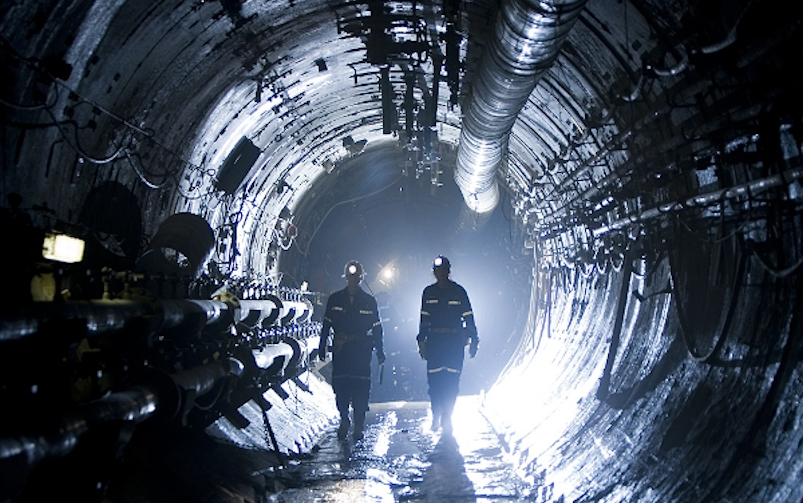Novagold's Donlin project in Alaska is a joint venture with Barrick Gold. Courtesy of Novagold.
(Like what you’re reading? Get our weekly recap delivered straight to your inbox each Friday.)
Welcome back to your weekly mining news recap, where we catch you up on some of the news you may have missed. This week’s headlines include Teck’s carbon neutrality goal for 2050, UBC team organizing Canada’s first student mine rescue competition and Federal Court dismisses an Indigenous appeal of the Trans Mountain pipeline.
To reduce fossil fuel consumption and transportation costs, off-grid mines are looking to hybrid microgrids, systems which manage power from multiple sources to create a stable power supply. Microgrids make it easier for companies to integrate renewable power, such as wind or solar, and use back up generators and batteries to maintain power when generation from wind or solar dips.
Codify Legal Publishing has launched a database to help keep on top of changes in mining legislation. The Canadian Mining Feed includes government legislation, bills, statutes and regulatory publication from Canada at the federal, provincial and territorial levels and is updated twice a day to reflect any updates or changes.
Teams from the University of British Columbia, University of Alberta, Laurentian University and Colorado School of Mines will gather in Vancouver from Feb. 21 to 22 to take part in Canada’s first mine rescue competition for students. Organized by the UBC mine rescue club, the Canadian Inaugural Mine Rescue Competition will challenge students to work together as they face off in five mine rescue tasks. The UBC team hopes that their competition will inspire more students to participate or start their own mine rescue groups.
Cameco has released its 2019 fourth quarter results and set its guidance for 2020, adding 36 million pounds of deliveries to its contract portfolio. In January 2018 Cameco suspended its uranium operations at McArthur River and Key Lake in northern Saskatchewan, as a result of a weak uranium market. President and CEO of Cameco Tim Gitzel stated that if uranium prices rise to reach expected demand, it “will provide the opportunity for us to capture additional value in our contract portfolio and support the restart of our tier-one assets.”
In accordance with the Paris Agreement, Teck announced its goal to reach carbon neutrality by 2050, matching Canada and Chile’s commitments to be carbon neutral by the same year. The company’s roadmap to carbon neutrality includes alternate methods of moving materials, implementing cleaner power sources and improving efficiency to ultimately minimize or eliminate emissions. Teck also plans to increase copper production at its Chilean Quebrada Blanca project as “an investment into the metals needed for the transition to a low-carbon economy.”
Teck also announced this week that poor weather in B.C. is impacting rail and terminal performance, resulting in lower first quarter steelmaking coal sales for its first quarter. Heavy rain, snow and extreme cold have caused delays in rail transportation, cutting an estimated one million tonnes from its sales.
The Federal Court of Appeal has dismissed an appeal by Indigenous groups challenging the expansion of the Trans Mountain expansion project in a unanimous 3-0 decision, as reported by CBC. The ruling states that Ottawa’s consultation process, in which representatives met with 120 Indigenous communities throughout British Columbia and Alberta, was “reasonable” and “meaningful.” This is the project’s second recent legal victory following a Supreme Court decision that dismissed the B.C. government’s attempt to block the pipeline in January.
Golden Predator announced a project coordination committee with the Yukon government for its Brewery Creek mine restart near Dawson City, Yukon. The committee met for the first time at B.C.’s Association of Mineral Exploration Roundup Conference in January, and will share and coordinate information on the project’s development and production plans. The committee is part of Golden Predator’s work to reopen the gold mine, having launched a feasibility study for the project in November 2019. The heap leach mine was last in operation in 2002.
Novagold’s flagship Donlin Gold project has secured several key authorizations from the Alaska Department of Natural Resources. The permits include land use and material site authorizations for the proposed transportation facilities. The project is a joint venture with Barrick Gold and, according to Novagold, has a measured and indicated mineral resource of 39 million ounces of gold from 541 million tonnes grading at 2.24 grams per tonne.
SEMAFO released a restart plan for its Boungou mine in Burkina Faso. Operations at the mine were suspended in November 2019 following an ambush on SEMAFO mine employees in which 39 people were killed. Operations at Boungou processing plant have restarted, and the company has begun transporting employees to the mine site by helicopter. SEMAFO expects that mining will recommence in the fourth quarter, though the company said this restart plan will require support from the government as well as contractors and suppliers for the mine.
If you’ve got feedback, you can always reach us at editor@cim.org. If you’ve got something to add, why not join the conversation at our Facebook, Twitter or LinkedIn pages? Like your recap with a few more gifs? Check out our mining news recap stories on our Instagram.



